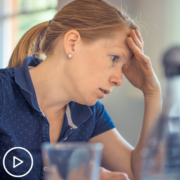Improving Life with MPNs: The Latest Research and How to Get Involved from Patient Empowerment Network on Vimeo.
Can yoga and meditation help improve life with an MPN? Researchers Dr. Jennifer Huberty and Ryan Eckert share what they’ve learned in their research in complementary medicine and how you can get involved.
Dr. Jennifer Huberty is an Associate Professor at Arizona State University. She focuses her research on the use of complementary approaches to manage symptoms and improve quality of life for patients living with myeloproliferative neoplasms. More about Dr. Huberty here: chs.asu.edu/jennifer-huberty.
Ryan Eckert currently works at Mays Cancer Center, home to UT Health San Antonio MD Anderson Cancer Center. Ryan is the Research Coordinator for the MPN QoL Study Group and assists in research related to complementary health approaches in myeloproliferative neoplasms and other hematological disorders.
See More From the The Path to MPN Empowerment
Related Programs:
Transcript:
Dr. Huberty:
My name is Jennifer Huberty. I’m an associate professor at Arizona State University in the college of health solutions, and I’m preliminarily a researcher.
I do teach a course a year, but I do research, mostly using complementary approaches delivered digitally, and I focus on cancer patients and also middle-aged pregnancy age lifespan, if you will, of women. So, women’s health and cancer.
Ryan:
My name is Ryan Eckert, and I’m a research coordinator with the Mays Cancer Center, which is at University of Texas Health in San Antonio.
So, in regards to what I’m excited about with the research that we have ongoing, I’m excited about the potential to help improve MPNs’ just quality of life and their well-being in general.
It’s a pretty under-studied area, especially as it relates to MPNs specifically, so there’s been a lot of work over the past couple decades as it relates to pharmacologic and more medicine-derived approaches with MPN patients, and we’re just now kind of realizing that there’s a little bit of a gap in some of the research that we’ve been doing, and there’s some unmet symptom burden needs and quality of life needs among MPN patients, and me, my background is more so in exercise science, and so, I’m all about the complementary approaches and the physical activity-based approaches.
And so, it’s pretty exciting for me to see the field of just cancer research in general, but also the research as it relates to MPN, start to evolve more towards the complementary and alternative approach route as it relates to mindfulness, meditation, yoga, and other physical activity interventions.
Dr. Huberty:
In relation to what I’m excited about with MPN research, I could say ditto to exactly what Ryan just said because he said it very well, and I feel strongly the same, and my background is in exercise physiology, and I’ve been working – helping women and cancer patients adopt physical activity behaviors. But, yoga is a physical activity behavior, but it has this really cool mindfulness component.
And, meditation has this mindfulness component where it’s exciting to see that we can be educating and providing MPN patients with a way to manage their symptoms themselves and rely a little bit less on their physicians in terms of “I’m feeling really anxious. What can I do?” If you’re feeling anxious, we’re giving them the tools that they can use to work on the anxiety themselves.
So, quieting their mind, allowing them to understand that it’s okay to feel anxious, and there’s nothing wrong with them, and if they’re having fears, that that’s normal, and that inviting those feelings and emotions in and just quieting their minds through yoga or meditation is so powerful. And so, I’m really excited about the fact that we’re giving them a tool that’s not just “Here’s a pamphlet, here’s what you should do,” we’re actually providing them an opportunity to practice it, to do it safely in their homes, and we’re also giving them a resource that’s consumer-based.
So, all of our interventions – the yoga and the meditation that we’ve been working on – have been with partners. So, our yoga partner is Udaya.com then, Calm.com, which is the meditation app. And so, these are things that we might provide for patients for free during the study, but when the eight-week or 12-week study is over, typically, any patient, any participant wouldn’t have access to the intervention anymore, but here we are with a consumer-based product that’s available to them.
So, we’ve taught them how to use it, we’ve made them comfortable, we’ve helped them to see that they can see improvements in the way that they feel, and then they have the ability to continue to use this as needed. Symptoms are gonna change over time – less anxious, more anxious, less fatigue, more fatigue, those kinds of things – and this helps them with the ups and downs of symptoms. So, I’m super excited about offering something to the patients that can be a lifelong friend, if you will.
Ryan:
So the MPN quality of life study group is a little bit of an acronym for the myeloproliferative neoplasm quality of life study group, and so, Dr. Mesa has obviously been working in this field of MPN research for decades now, and he had what he used to call the MPN quality of life international study group, and that was basically just a variety of different researchers from the U.S., and also abroad internationally.
Based in the U.S., we have a range of different physicians and researchers across four or five different institutions, and we all tend to focus on very similar research involving MPNs or other blood-related cancers. And so, the MPN quality of life study group is essentially just a collection of those – I think it’s somewhere between 10 and 12 different physicians and researchers that do similar research.
So, in order for patients to find out more about the MPN quality of life study group, they can – so, we do have a website that we just created a little less than a year ago, and it’s just www.mpnqol.com, and if they go there, we just have some information related to what our mission as a group is. We also have a tab on that website that explains all the different researchers and positions that make up the group.
So, if you were interested in, say, a particular researcher or physician, there’s links in there to go to their professional websites, and then, there’s also links within the tab of that website that covers some of the ongoing studies that we have. So, patients can go there, click on that link, and fill out an eligibility survey for a study that they might be interested in, and then, the project coordinator or research assistant will be in touch with them related to their eligibility







